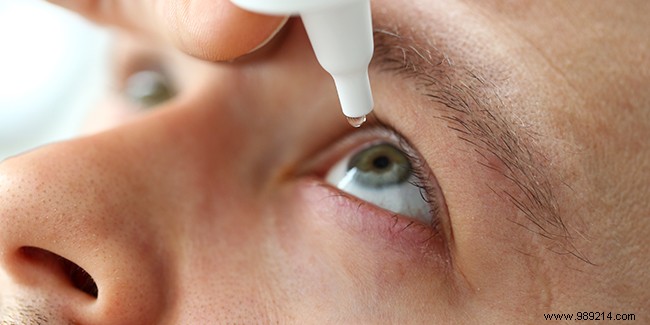
If your eyes are often watery without apparent cause, reddened, and frequently burned, you are definitely among the 25% of older people who suffer from dry eye syndrome. The eye needs moisture to function properly. The tear film, i.e. tears, plays this role. But if the tears are not well distributed in the eye, the latter suffers from itching, the eyelids swell with consequent eye fatigue, even veiled and blurred vision. How to prevent and fight against the feeling of dry eyes
Different factors can favor the appearance of the sensation of dry eyes, a very common ophthalmological condition, especially in winter. It is therefore advisable to put the maximum chance on your side by not exposing yourself, or as little as possible, to some of them, which are avoidable.
As we age, we make less and less tears, almost 60% less than young people. On the other hand, seniors more often have wide tear ducts which do not allow the normal flow of tears into the eyes and the feeling of dry eyes may appear.
Women are more affected by the sensation of dry eyes, twice as much as men. This situation is particularly caused by hormonal changes during pregnancy or after menopause.
Some medications can cause dry eyes. This is the case, for example, of certain contraceptive pills, antidepressants, analgesics, antihistamines, diuretics, or sleeping pills.
Working or staying for long hours in front of a computer screen can lead to a feeling of dry eyes because the blinking of the eyelids, which moisten the eye, becomes rarer and causes dry eyes and irritation.
Being exposed to air pollution, dust, cigarette smoke, air conditioning or wind are all risk factors for suffering from the feeling of dry eyes.
Wearing contact lenses can amplify the feeling of dry eyes by preventing the tear film from spreading properly throughout the eye.
We have seen the risk factors for dry eye syndrome if possible to circumvent. Other behaviors are also recommended to prevent this problem.
First, if you are prone to the feeling of dry eyes, you should avoid getting air directly into your eyes as much as possible, especially in strong winds.
In your home, make sure that the ambient air is not too dry. The humidity level should be between 30 and 50%. For example, use a humidifier and do not raise the temperature of your heating too high. Just like the air in your home, you must also hydrate yourself so that the eye can have sufficient reserves at its disposal to produce tears.
If you spend a lot of time in front of a computer screen, consider taking regular breaks, every 30 minutes, during which you blink and close your eyes.
Also, don't forget when going outside to wear sunglasses and, if you go to the swimming pool, specific protective glasses.
If you wear contact lenses, replace them with a pair of glasses at least once a week or apply lubricating eye drops that will help combat the dryness of your eyes.
There are different solutions to best treat the feeling of dry eyes.
The first and simplest solution is to use eye drops or artificial tears to moisten the eye. These solutions, eye drops, drops or gels provide rapid relief by hydrating the eye and eliminating burning sensations and itching.
Teaching your eyes to blink again, an essential movement to moisten them, may be necessary in some cases.
An antibiotic prescribed in the form of eye drops - azithromycin - can have positive effects on dry eyes. This treatment is to be followed two or three times a month to obtain satisfactory results.
If you feel dry eyes, your doctor can prescribe so-called scleral lenses. These are large-diameter, water-filled contact lenses that permanently moisten the cornea of the eye.
For more severe cases of dry eye, surgery to artificially block the tear evacuation orifices to direct them into the eye may be necessary.